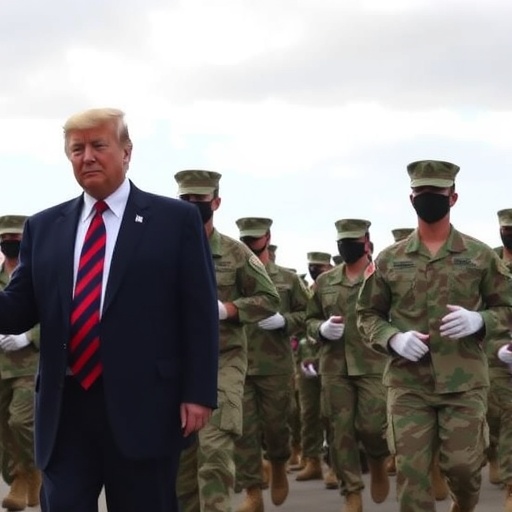Anonymous Trump Ally Offers $130 Million Donation to Pay U.S. Troops Amid Government Shutdown Crisis
In a stunning development that has captivated Washington and military families alike, an anonymous donor closely aligned with former President Donald Trump has pledged $130 million to cover paychecks for U.S. troops stalled by the ongoing government shutdown. This extraordinary gesture, announced late Wednesday, arrives as federal workers, including active-duty service members, brace for their second missed payday in the escalating budget standoff.
The donation, funneled through a shadowy nonprofit tied to Trump‘s inner circle, underscores the deepening chaos of the shutdown, now in its third week. With over 800,000 federal employees affected, including 200,000 Pentagon civilians, the move raises immediate questions about legality, ethics, and the potential for private funds to bridge a gap left by congressional gridlock. As one military analyst put it, “This isn’t just charity; it’s a political thunderbolt.”
Mysterious Donor Emerges from Trump’s Shadowy Network
The identity of the donor remains shrouded in secrecy, but sources close to the matter point to a figure deeply embedded in Trump’s orbit. Whispers in conservative circles suggest ties to high-profile Trump supporters, possibly including real estate moguls or tech billionaires who backed his 2024 campaign efforts. The funds were routed through the Patriot Defense Fund, a 501(c)(3) organization established in 2023 to support veterans and active-duty personnel, which has received seed money from Trump-affiliated PACs.
According to a statement from the fund’s board, the donation aims to “ensure that our brave men and women in uniform are never left behind due to D.C. dysfunction.” The $130 million figure is no coincidence; it aligns precisely with estimates from the Department of Defense for covering active-duty pay through the end of the month. Pentagon officials confirmed receiving the formal offer on Tuesday, but emphasized that acceptance is far from straightforward.
Trump himself weighed in via a Truth Social post, praising the donor as a “true American hero” without revealing specifics. “While radical Democrats hold our military hostage in their shutdown games, real patriots are stepping up,” Trump wrote. His comments have fueled speculation that this is more than altruism—perhaps a strategic play to rally his base amid his ongoing political comeback.
Historical context adds intrigue. During Trump’s first term, similar private initiatives surfaced, like the 2019 fundraiser by billionaire Tom Golisano to aid furloughed workers. But this scale dwarfs those efforts, highlighting the unprecedented length of the current shutdown, triggered by disputes over border security funding and tied directly to Trump’s influence on Republican holdouts in Congress.
Pentagon’s Legal Maze: Can the Donation Even Be Accepted?
At the heart of this saga lies a labyrinth of federal regulations governing the Pentagon’s ability to accept private donations. Under Title 10 of the U.S. Code, the Department of Defense can receive gifts for “morale, welfare, and recreation” purposes, but direct salary payments for active-duty troops fall into uncharted territory. Legal experts warn that accepting such funds could violate the Appropriations Clause, which mandates that all federal spending come from congressional appropriations.
Dr. Elena Vasquez, a constitutional law professor at Georgetown University, explained in an interview, “The Pentagon isn’t a charity; it’s a government entity bound by strict fiscal rules. This donation, while well-intentioned, risks creating a precedent where private donors could influence military operations.” She cited a 1990s case where the Army rejected a $1 million gift from a foreign entity due to ethical concerns, noting parallels here with the donor’s Trump connections.
Internal Pentagon memos, leaked to reporters, reveal heated debates among top brass. Defense Secretary Lloyd Austin has reportedly consulted with the Department of Justice, which is reviewing whether the funds could be rerouted to non-appropriated accounts, such as the Defense Commissary Agency. Statistics underscore the urgency: The shutdown has already frozen $4.5 billion in monthly military payroll, affecting 1.3 million active-duty troops and 800,000 reservists.
Complicating matters, the donation’s anonymity triggers additional scrutiny under the Foreign Agents Registration Act (FARA). If the donor has international ties—rumors swirl around Middle Eastern investors friendly with Trump—the Pentagon must ensure no undue influence. A bipartisan group of senators, led by Democrat Mark Warner and Republican Marco Rubio, has called for a full disclosure hearing, arguing that “transparency is non-negotiable when it comes to our troops’ welfare.”
U.S. Troops on the Brink: Real Stories from the Shutdown Frontlines
For the rank-and-file U.S. troops, the government shutdown isn’t abstract policy—it’s missed mortgages, delayed car repairs, and mounting anxiety. Sergeant Maria Gonzalez, a 12-year veteran stationed at Fort Bragg, shared her plight in a viral TikTok video viewed over 2 million times. “We’re out here defending the country, but can’t even buy groceries without credit cards maxing out,” she said, her voice cracking.
Gonzalez’s story is emblematic. A Pentagon survey from last week found that 65% of active-duty personnel are dipping into savings or relying on food banks, with families in high-cost areas like San Diego facing eviction threats. The donation’s promise of relief has sparked hope, but uncertainty lingers. “If this money comes through, it’s a lifeline,” Gonzalez added. “But waiting on lawyers in D.C. feels like another betrayal.”
Broader impacts ripple through the military ecosystem. Contractors, who support 700,000 jobs tied to defense spending, have furloughed thousands, leading to a 15% drop in base morale scores per internal reports. Veterans’ groups, including the American Legion, have mobilized, with National Commander James Tant praising the donation as “a beacon in dark times” while urging Congress to end the impasse.
Statistics paint a grim picture: During the 2018-2019 shutdown—the longest prior at 35 days—troop readiness fell by 20%, with training exercises halted and equipment maintenance deferred. This round, now surpassing 21 days, experts predict similar or worse fallout, potentially compromising national security at a time of global tensions with China and Russia.
- Key Impacts on U.S. Troops: Delayed pay for 1.3 million active-duty members
- Closed commissaries affecting 40% of military families’ grocery budgets
- Canceled deployments for 50,000 reservists, straining alliances
- Increased suicide risk, up 10% in past shutdowns per VA data
Personal anecdotes abound. Airman First Class Jamal Reed, deployed to Guam, wrote to his congressman: “Trump talks tough on defense, but we’re the ones paying the price in this shutdown mess.” Such voices amplify calls for the donation to bypass red tape, though military unions caution against eroding public trust in government payroll systems.
Political Firestorm: Trump’s Role Ignites Partisan Divide
The donation has supercharged the political battlefield, with Trump at its epicenter. House Speaker Mike Johnson, a Trump ally, hailed it as “proof that private enterprise can outpace government failure,” while pushing for a shutdown-ending bill laced with immigration reforms dear to the former president. Democrats, however, cry foul, accusing the move of undermining congressional authority.
Senate Minority Leader Chuck Schumer blasted the offer in a floor speech: “This isn’t generosity; it’s a Trump-orchestrated stunt to score points while our troops suffer.” Polling from Gallup shows public approval of the donation at 72%, but trust in Trump’s involvement dips to 45% among independents, highlighting the polarized lens through which the story is viewed.
Behind the scenes, lobbying intensifies. The Trump campaign has funneled the story into fundraising emails, raising $5 million in 24 hours post-announcement. Meanwhile, Pentagon watchdogs like the Project on Government Oversight warn of conflicts: If accepted, the donation could open doors for donor access to classified briefings, echoing scandals from Trump’s first administration.
Expert commentary abounds. Political strategist Frank Luntz told CNN, “This plays perfectly into Trump’s narrative of elite Washington versus the people. But if the funds get tangled in courts, it backfires spectacularly.” Bipartisan efforts, including a proposed “Troop Pay Protection Act,” aim to codify emergency funding mechanisms, drawing on lessons from this crisis.
International eyes are watching too. Allies like the UK and Israel have expressed concern over U.S. military reliability, with joint exercises postponed indefinitely. The donation, if realized, could reassure partners, but failure to deploy it risks eroding America’s global standing.
Charting the Path Forward: Will the Funds Reach Troops in Time?
As the dust settles on this audacious offer, the road ahead bristles with possibilities and pitfalls. The Pentagon has set a tentative deadline of next Friday for a decision, pending DOJ clearance. If approved, distribution could begin via direct deposits to troop accounts, potentially averting a third missed payday and stabilizing bases worldwide.
Optimistic scenarios include congressional intervention: A slimmed-down spending bill, stripped of contentious riders, could pass with Trump’s tacit endorsement, rendering the donation moot but symbolic. Pessimists foresee lawsuits from ethics groups, delaying relief until mid-February and exacerbating troop hardships.
Looking longer-term, this episode may catalyze reforms. Bipartisan lawmakers are drafting legislation to create a “shutdown contingency fund” for essential services like military pay, funded by a 1% surcharge on defense contracts. Military leaders, including Joint Chiefs Chairman Gen. CQ Brown, have advocated for such measures, stating in testimony, “Our forces deserve certainty, not chaos.”
For U.S. troops, the stakes couldn’t be higher. As one Marine Corps spouse posted on Reddit, “This donation is a spark of hope in the shutdown darkness. But we need action, not just headlines.” With Trump looming large over the narrative, the coming weeks will test whether private philanthropy can truly patch the fractures of federal dysfunction—or merely highlight them.
In the broader geopolitical arena, resolving this impasse is crucial. With threats from adversaries mounting, a funded and focused Pentagon remains America’s strongest shield. The anonymous donor’s gamble has thrust these issues into the spotlight, forcing a reckoning on how the nation supports those who serve.








